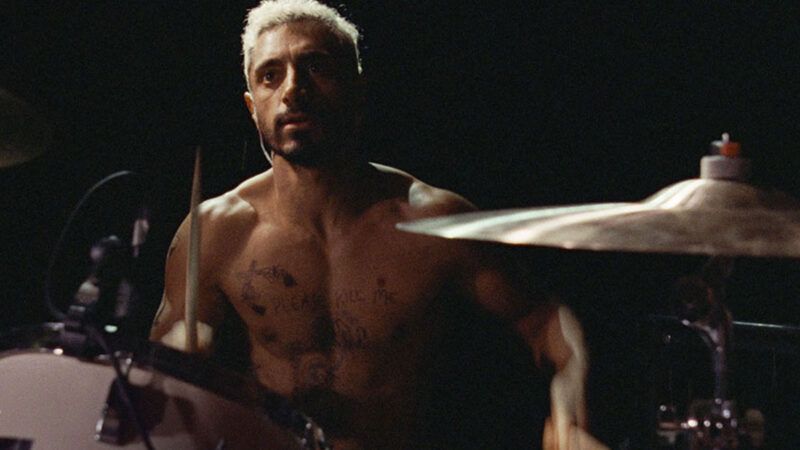Sound of Metal Creates an Entire World Out of Sound
For a small production, it's a remarkable technical achievement.

What, exactly, does metal sound like? Sound of Metal, writer-director Darius Marder's gentle story of loss, addiction, and recovery, offers a series of answers.
At first, it's musical, the enveloping cacophony of brutal noise rock heard from the throne of a drum kit. The drummer in this story is Ruben Stone (Riz Ahmed), a four-years-clean drug addict who has devoted his life to playing brash, pulverizing music with his partner, Lou (Olivia Cooke). The movie puts you in the middle of the sound as Ruben crashes cymbals and slams out impossible blast-beats. If you've ever played in a rock 'n' roll band before, you'll recognize the sensation—the intimacy and connection with the crowd, the overwhelming swell of the music as it drowns out all else. If you haven't played in a band before, this is about as close to the live-show experience as you'll get. Sound of Metal doesn't just show you what it's like to play music. It shows you what it's like to live it.
Which makes it that much more painful when Ruben discovers that he's rapidly losing his ability to hear. Suddenly, the movie's soundtrack shifts; dialogue becomes warbled and muddy, odd ringing noises interject themselves where they shouldn't. The whole world suddenly feels out of whack. Once again, the sonic simulation of hearing disorientation is strikingly vivid and realistic. It's more than an irritating ringing noise; it's a fundamental and deeply frightening shift in how you interact with the world.
Eventually, Ruben enters a recovery home in the Midwest, a place where people with histories of addiction can learn to be deaf. He resists at first, but learns sign language as part of a class of deaf children, and begins to find a community with the other adults and teachers. And in the process, the movie offers a second answer to the question of what metal sounds like: This time, it's the physical pulse of tapping on a slide. Although Ruben and the deaf children he's surrounded with cannot hear music, they can feel it, so just as they helped teach him to speak in signs, he begins to teach them to play drums. Once again, the sound of metal is not just a particular sound he hears, but a way of perceiving and communicating with the rest of the world.
That sound transforms one more time in the movie's third act, after Ruben scrapes together money to surgically install a cochlear implant, giving him a new way to hear. The implant, which bypasses the cochlear nerve, is attached to a small array of microphones and digital signal processors that he wears on his head. He can hear again—but it's a different kind of hearing. It's digitized and glitchy, clear enough to make out dialogue, but distinctly unmusical in its character. It sounds metallic. And, yet again, that sound is his entire world, and the movie's.
Which also means that it becomes the viewer's. Sound of Metal is a sensitive and empathetic film about losing your identity and finding a new one, and one of the ways it showcases Ruben's loss of identity is by subsuming viewers in his sensory disorientation.
It's also a movie about the life-shaping and live-saving influence of subcultures, from the metal-music world where Ruben begins to the deaf community where he ends up to the shaggy French villa he visits during the film's final stretch. Marder gives each location a distinct sense of place, showing both the subtle and obvious ways in which the particular culture of each location inevitably changes one's outlook and identity.
But for a relatively small, naturalistic production about bodily frailty, Sound of Metal is also a remarkable technical achievement. The movie's sound design isn't as flashy as a new Star Wars or Transformers film, but its representation of Ruben's hearing loss and subsequent transformation is as remarkable as anything I've heard from a movie. Writer-director Darius Marder and composer-sound designer Nicolas Becker have built an immersive, densely realized depiction of personal and sonic degradation that plays out in meticulously rendered surround sound.
Sadly, the streaming release (it's playing on Amazon Prime Video) means that although the film will be widely available, many home viewers won't have the opportunity to hear the art and effort that went into the surround mix. If you don't have a surround-sound system at home, this is a movie that's worth watching on a good pair of over-ear headphones in order to experience the immersive aural depth and detail. Well-acted, warm, and endlessly humane, Sound of Metal is perhaps too understated at times, but it's a worthwhile reminder of the importance of good sound in both movies and in life.


Show Comments (13)